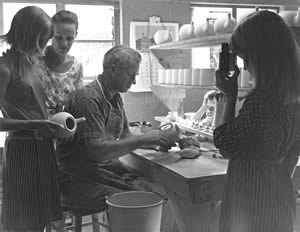Folk Culture

Community festivals and seasonal events can be found across the state of Tennessee. Many feature several generations of a family performing a time-honored folk tradition, whether it be in music, dance, blacksmithing or basketry. Some stem directly from ethnic roots, while others derive from memory or inspiration.
While the very earliest Tennessee handicrafts are preserved as museum objects, Tennesseans also participated in the Handicraft Revival of the 1930s. A burgeoning national interest among art collectors and historic preservationists led to a demand for authentic craft objects and untouched cultural expression. Accompanying this desire to preserve and capture the real thing was a movement in which professional craft artists and musicians attempted to refine and re-teach the traditional arts. Additional support was provided by federal programs of vocational education for rural adults in which professional instruction programs for income-producing trades and craft production were part of the extension programs of the Home Economics Department of the University of Tennessee, which soon affiliated with the Arrowmont School of Arts and Crafts at the former Settlement School in Gatlinburg. The coming of the Tennessee Valley Authority to rural Tennessee brought with it such community initiatives as the Norris Dam Craft workshop and other outreach activities for those living in the “dam villages” set up as temporary housing for workers and their families.
The isolated Highlander Center on Monteagle Mountain was one place where inter-racial community gatherings, often designed to highlight and celebrate folk traditions representing the range of human experience, were held. The folk revival of the 1960s also led to public events in which the mingling of groups formerly kept apart by society was a goal and the diversity of performers and audiences were seen as virtues. Tennessee Grassroots Days, held in Nashville’s Centennial Park from the late 1970s through the 1980s, was a showcase for African American folk music in all genres.
The Tennessee Arts Commission’s folk life program documented traditional artisans, organizations and events from music to material culture and folkways to works of art from the 1970s to the 2000s. Thousands of photographs, interviews, clippings, and audio-visual materials now in the collection of the Tennessee State Library & Archives can be referenced alongside the collection of folk life materials generated during the same period by the activities of the Tennessee State Parks. The list of Tennessee artists featured at the Smithsonian Festival of American Folk Life and as recipients of the National Heritage Fellowship, the folk artists and performers who have received Tennessee Arts Commission grants over the years, and, more recently, those honored by the Tennessee Governor’s Awards for Folk Heritage, represent a long legacy and a surprising diversity of cultural expression, originality, and practical inventiveness.
Related Content
See more images in the Trials, Triumphs, and Transformations collection